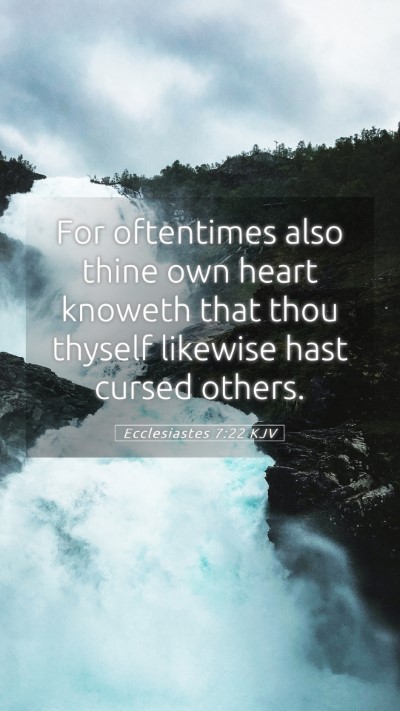Understanding Ecclesiastes 7:22 - A Comprehensive Commentary
Ecclesiastes 7:22 states: "For your heart knows that many times you yourself have cursed others." This verse invites readers to reflect on human relationships and the nature of judgment.
Contextual Background
This verse appears within the broader discourse of the book of Ecclesiastes, attributed to Solomon. The book explores themes of life’s meaning, the futility of earthly pursuits, and the intricacies of wisdom.
- Historical Context: Ecclesiastes was likely written during a time of relative peace and prosperity, prompting reflection on deeper truths.
- Genre: The text is part of wisdom literature, which often uses observations of life to convey moral and theological insights.
Verse Analysis
Commentaries from Matthew Henry, Albert Barnes, and Adam Clarke provide a multifaceted understanding of this verse:
- Matthew Henry: He emphasizes the introspective nature of the verse, suggesting that our awareness of our own failings should foster humility and compassion towards others. He notes that we are often quick to judge but must remember our own shortcomings.
- Albert Barnes: Barnes interprets this verse as a reminder that we tend to judge others harshly while being oblivious to our faults. He argues that recognizing our own propensity to sin should lead to greater grace in our interactions with others.
- Adam Clarke: Clarke provides insight into the psychological aspect, highlighting that one's guilt often bears a burden of awareness. He points out that the heart—the center of emotions—holds the truth of our actions, whether good or bad.
Key Themes
The key themes emerging from this verse include:
- Human Nature: We are reminded of our shared flaws and the universal tendency to criticize others while ignoring our failings.
- Self-Reflection: There is a strong call for introspection; the acknowledgment of personal shortcomings can lead to empathy.
- Grace: Understanding our faults allows us to extend grace and forgiveness to others.
Practical Applications
This verse encourages readers to:
- Practice Self-Examination: Regularly assess personal attitudes and judgments towards others.
- Encourage Forgiveness: Foster a culture of forgiveness in personal relationships, bearing in mind one's own need for mercy.
- Participate in Biblical Study: Join Bible study groups to deeply engage with scripture and understand its implications in daily life.
Biblical Cross References
This scripture resonates with several other biblical passages:
- Matthew 7:1-2: "Do not judge, or you too will be judged..." which underscores the theme of mutual judgment and understanding.
- James 4:11-12: A call against speaking evil of one another, reflecting the same interpersonal wisdom.
- Luke 6:37: "Do not judge, and you will not be judged..." reinforces the importance of self-awareness and restraint in judgment.
Conclusion
In conclusion, Ecclesiastes 7:22 serves as a profound reminder to tread lightly when casting judgment. By embracing the fullness of our own human experience, we can learn to interact with others with grace and understanding. This understanding enriches our biblical study, prompting deeper scriptural interpretations and fostering heartfelt discussions in Bible study groups.


